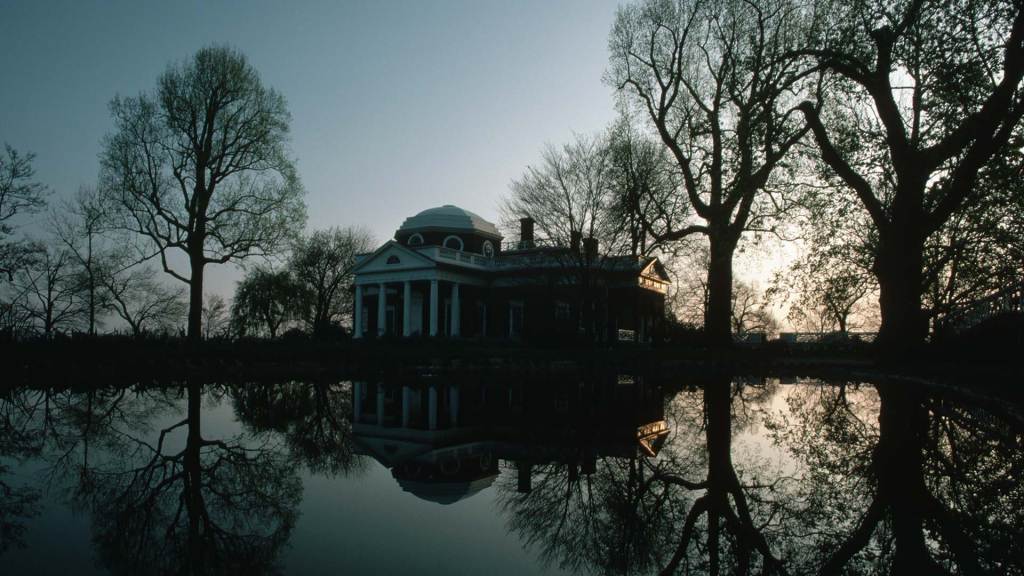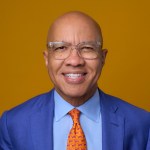 Tim Wright / Getty
Tim Wright / GettyThis speech was presented by Darren Walker during “Ascendant Weekend,” in which over 400 descendants of enslaved people attended a rededication of the Burial Ground for Enslaved People at Monticello in Charlottesville, Virginia.
I must begin in gratitude: To the Reverend Carolyn Dillard, whose invocation lifts our sights and our souls; to Leslie Greene Bowman and Cinder Stanton, brilliant historians both, whose moral leadership and fortitude brings us to this moment; and—invoking the great Julian Bond, a generation later—to the descendants of the human beings buried as property whom we remember, and sanctify, as people.
Today, we honor your inheritance. We rededicate this space to you—and for you, and with you—in recognition of your ancestors, and all of our ancestors.
Across the nearly four million square miles of Jefferson’s republic, 246 years on, there is no place more American than this: Jefferson’s Monticello.
It is, quite literally, both a monument to our noblest ideals and the very blood-stained earth where Jefferson enslaved some 400 human beings, in direct contradiction to those ideals. It at once gives testimony to American genius and American ignominy. It embodies American pride and American patriotism and our American promise—and, in the same breath, the searing, uniquely American pain of generations. The shame of our history, a past that is all too present.
Like Jefferson himself, these grounds are a paradox defined by a perverse dissonance.
Less than half a mile from here, Mr. Jefferson lies beneath a granite obelisk. At his request, that monument of coarse stone lists the three accomplishments for which he wished to be remembered: the Declaration of American Independence, the Virginia religious freedom statute, the University of Virginia.
These institutions, and the ideals they encompass, became a beacon to the world. They matter still—now, perhaps, more than ever. Jefferson’s declaration, our founding affirmation of equality and representation; Jefferson’s religious freedom statute, of tolerance and inclusion; Jefferson’s university, of reason, and science, and truth, of public education as the means to good citizenship.
But there is, of course, a fourth cornerstone of Jefferson’s legacy, one he omitted from his self-curated account: the institution of slavery, which begat the institution of white supremacy, with which we still reckon today—from lynching to Jim Crow, to redlining, to mass incarceration, to police brutality, and beyond.
In so many ways, Jefferson ensured that the republic he wrote into being would break through from an old world to a new—that it would be the vanguard of a new age. But in at least this one way, Jefferson allowed the barbaric, the callous, and the cruel to carry through from the old into the new. He and the founding generation left it to others to fix what they lacked the courage to face themselves.
And so, it is appropriate—necessary—that we recognize this fourth cornerstone, even and especially on this auspicious day and weekend, when we celebrate the fullness of American freedom, the jubilee of liberation.
We do so not to diminish equality and tolerance and reason—triumphs of human achievement—but to illuminate how we have failed to live up to them from the beginning; to illuminate how we got from there to here; to illuminate who we are: unequal at our creation, unequal still, but becoming more equal thanks to the sacrifice of our ancestors, our elders, and so many of you, on the frontlines of the fight for justice today.
In fact, to illuminate this legacy—as you all have in preserving and restoring this space—is to understand something profoundly important about the American story, about American inequality. Look no further than these graves themselves, and you will see the evidence.
In life, Mr. Jefferson accomplished the three momentous achievements on his headstone, and many beyond them. And in life, he also enslaved more than 600 human beings across his properties, two score of whom rest here.
In death, Jefferson was afforded the dignity and respect to define his own legacy. And in death, as in life, the people he enslaved were deprived of that right, among countless others.
For decades, the 40 graves here were considered lost to history, a secret hiding in plain sight. In whispered words and inherited wisdom, it was the descendant community—you, your parents, your grandparents—who remembered them and who returned to them.
Today, some of these graves are marked with uninscribed stones; the vast majority are not marked at all. Hundreds more elude us yet. The remains of many ancestors may never be found.
We convene with them today—all of them. Those who are lost and those who have been found. Those whose names escape us, and those whose names we say, with pride.
We gather to help tell an indispensable story, too long left out—to pick up the chisel and, as best we can, to carve our ancestors’ epitaphs into the negative space.
It was one of Jefferson’s successors, Abraham Lincoln, at the dedication of a different burial ground in Gettysburg, who defined the challenge of his time, and of ours: the burden and privilege of being American.
We are engaged, Lincoln said, in a test of whether Jefferson’s vision could triumph—whether government of, by, and for the people could long endure. Indeed, we remain engaged in a great conflict between authoritarianism and autocracy on one side and the American idea, our democratic values, on the other.
Here and now, like for Lincoln in Gettysburg, we cannot consecrate or hallow this sacred burial ground. For it was the people—the enslaved people, who led dynamic, complicated, meaningful lives here—who have long since venerated it. It was the enslaved people who loved and celebrated and laughed here; who were sold into bondage here; who were torn away from their families here; who endured and persisted here; who lived here, and who died here: These human beings made Monticello. They consecrated this place centuries ago.
And yet, in marking this burial ground anew—by marking it for the descendants of the ancestors who lie here, for the descendants of the enslaved across this land and around the world; for all freedom-seeking, freedom-loving people everywhere—we all move a little closer, together, toward realizing our inalienable American birthright, toward what Frederick Douglass would call “absolute equality.”
We all move a little closer to the multiethnic, multiracial, pluralist democracy that Mr. Jefferson, paradoxically, both impeded and made possible.
Thank you, all, for joining in the shared effort to make it so—in this most solemn occasion, in this most American of places.
